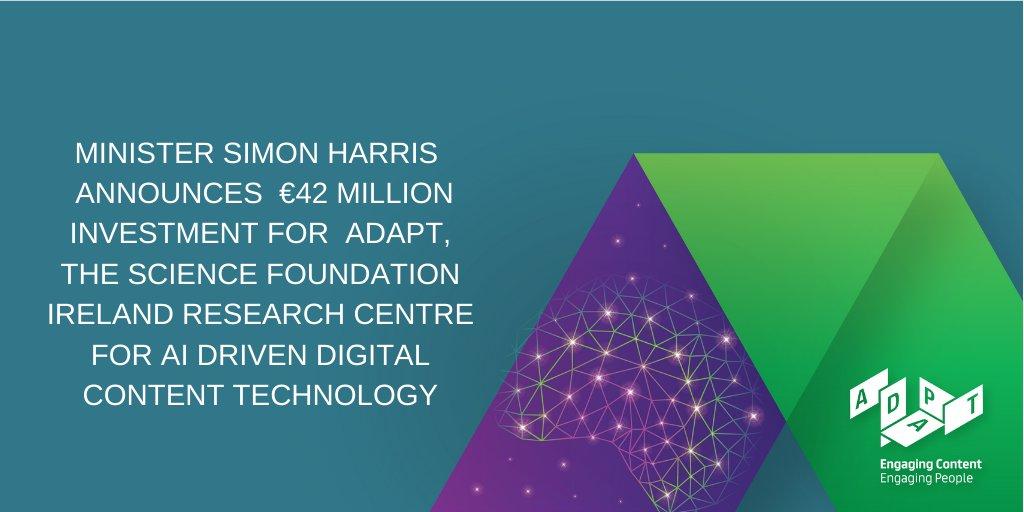

ADAPT awarded €42 million to extend its research over the next six years
ADAPT’s research vision is to pioneer new forms of AI-driven Digital Content Technology to empower individuals and communities in their work and everyday lives. In particular, ADAPT's research will enable next-generation digital engagement, across video, speech, text and immersive technologies, and support inclusion, accountability, and appropriate controls. The Centre’s work is driven by a long term goal of a Balanced Digital Society by 2030 and it is pioneering new Human Centric AI techniques and technologies including personalisation, natural language processing, data analytics, intelligent machine translation human-computer interaction, as well as setting the standards for data governance, privacy and ethics for digital content.
ADAPT’s international research leadership, research excellence, industry collaborations, multidisciplinary outlook, strategic national position, and the opportunities arising from its scale, makes our researchers highly sought after for collaboration and highly competitive in international funding programmes. The engagement with NENC-funded research across a spectrum of challenges and collaborators promotes research innovation in ADAPT, pushing the frontiers of knowledge and bringing new solutions to societal and industrial challenges. Since launching, ADAPT’s researchers have signed 43 collaborative research projects, 52 licence agreements and oversee 16 active commercialisation funds and 52 commercialisation awards. ADAPT has won 40 competitive EU research projects and obtained €18.5 million in non-exchequer non-commercial funding. Additionally, six spinout companies have been formed. ADAPT’s researchers have produced over 1,500 journal and conference publications. Nearly 100 PhD students have been trained.
ADAPT will significantly expand its expertise, capacity and geographical reach by doubling its academic base of PIs and FIs and by bringing on board four new partner institutions bringing the total to 8 research bodies (DCU, TCD, TU Dublin, UCD, NUIM, MTU, NUIG and AIT). This expansion will follow the established practice of strategically growing its research base through a programme of timely and targeted recruitment as new research opportunities and funding sources arise. In addition, ADAPT will extend its interdisciplinary research team by incorporating leading experts from the complementary fields of, Social Sciences, Communications, Commerce/Fintech, Ethics, Law, Health, Environment and Sustainability to drive better health and wellbeing outcomes.
ADAPT’s breakthrough technologies and research applications AI for Media Interaction, Digital Humanities, Health, Data governance, and Fintech are being applied across multiple Industry domains, expertly facilitated through the ADAPT Design and Innovation Lab (dLab) to deliver product and service innovation. ADAPT's Startup & Development team fosters and steers collaborations between researchers and AI entrepreneurs from startup to successful spinout resulting in 6 successful spin-outs to date and 16 commercialisation funds.
Welcoming the announcement, President of Dublin City University, Prof Daire Keogh said:
“This major investment is a resolute endorsement of the work of ADAPT researchers to harness the huge potential of new digital technologies. DCU welcomes the decision to expand ADAPT’s geographic spread, but especially its range of research disciplines. This will allow for innovative new collaborations that will help to address key challenges in areas such as health and the environment, for the benefit of ordinary citizens.”
